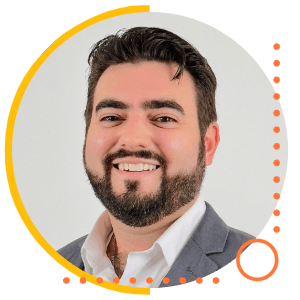Building Inclusive and Accessible Learning Experiences
Are you committed to creating learning experiences that are inclusive and accessible to all?
Join us for an online conference dedicated to exploring the intersection of accessibility and inclusivity in learning design.
DAY 1: August 27
101: Leadership’s Role in Building Inclusive Learning
Rebecca Alimorong, Robert Half
11:25 AM – 12:30 PM ET / 8:25 AM – 9:30 AM PT
Accessibility in learning isn’t just a design requirement—it’s a leadership responsibility. This session explores how inclusive learning cultures begin with intentional leadership, supported by organizational values, systems, and behaviors. When accessibility is championed at the top, it becomes more than a compliance effort; it becomes part of the organization’s core.
Learn more.
201: Accessible and Inclusive Learning Design That Goes Beyond Compliance
Daniel Iglesias, Advent Health
1:00 PM – 2:00 PM ET / 10:00 AM – 11:00 AM PT
“Designing for accessibility is about more than just checking boxes – it’s about creating meaningful, equitable learning experiences that empower all learners to succeed. In this session, explore the intersection of accessibility, inclusion, and instructional design. Discover how learning professionals can shift from compliance-based approaches to proactive, human-centered design rooted in the principles of Universal Design for Learning (UDL).
Learn more.
301: Beyond Compliance: Using the University of California Checklist to Build Better Courses
Doug Harriman, University of California Office of the President
2:30 PM – 3:30 PM ET / 11:30 AM – 12:30 PM PT
This session will take you on a tour through the University of California eCourse Accessibility Checklist. This resource has evolved over the years, including a major update in spring 2025, to aid eCourse developers in numerous ways. It provides criteria for ensuring eCourse accessibility and WCAG 2.1 AA compliance, as well as guidance on going beyond minimum requirements and striving to create a highly inclusive experience for learners with various disabilities.
Learn more.
401: A Plus-One Approach to Accessible and Inclusive Learning Design
James Kruck, Occupational Health and Safety Group
4:00 PM – 5:00 PM ET / 1:00 PM – 2:00 PM PT
Many L&D professionals feel overwhelmed by accessibility requirements, assuming they need to redesign everything from scratch. While we all know we need to make our training more accessible, we don’t always know where to start. What if you could make meaningful progress with just one small change at a time? This session introduces the “plus-one” strategy, a core practice drawn from Universal Design for Learning (UDL) that helps you expand accessibility and inclusion without overhauling your entire content library.
Learn more.
DAY 2: August 28
501: Using AI to Build Accessibility-First eLearning Experiences
Catherine Cash, Blue Origin
11:30 AM – 12:30 PM ET / 8:30 AM – 9:30 AM PT
Accessibility isn’t an add-on—it’s a design principle. But ensuring that eLearning content meets accessibility standards can be time-consuming and difficult to scale. This session explores how AI tools can help designers and developers create accessible content more efficiently, without sacrificing quality or compliance. You’ll see how generative AI and automation can support tasks like writing accurate alt text, creating accessible color palettes, checking for WCAG compliance, generating transcripts, improving keyboard navigation, and more.
Learn more.
601: Creating Exceptional Screen Reader Experiences in Learning Design
Jacob Wood, Accessible Games
1:00 PM – 2:00 PM ET / 10:00 AM – 11:00 AM PT
Have you ever wondered what your content sounds like to someone using a screen reader? Screen readers process your content differently than visual readers do. Without proper structure, even WCAG-compliant learning can be confusing to navigate. In this session, you’ll experience how a screen reader “sees” your content. You’ll listen to a screen reader navigate through a course to reveal hidden barriers that compliance checklists often miss.
Learn more.
701: Busting Barriers: A Learning Design Game
Diane Elkins, Artisan Learning
Amy Morrisey, Artisan Learning
2:30 PM – 3:30 PM ET / 11:30 AM – 12:30 PM PT
Designing truly inclusive learning experiences requires more than checking compliance boxes; it demands a broad understanding of real-world barriers that many learners face. In this interactive session, you’ll take on the role of learners with diverse needs and use our learning design card game to identify and tackle common challenges. You’ll analyze scenarios, identify barriers, and brainstorm solutions to make learning more inclusive. This fast-paced activity will shift your perspective and equip you with actionable strategies to improve accessibility in your own training designs.
Learn more.
801: Inclusive Microlearning using AI, Personas, Storytelling & Design Thinking
Arpita Pal, Inova Health System
4:00 PM – 5:00 PM ET / 1:00 PM – 2:00 PM PT
Your microlearning can offer an equitable, engaging, and effective experience to all learners. This session explores how you can embed inclusion, accessibility, and belonging into every stage of your microlearning design process using AI, inclusive persona design, storytelling, and liberatory design thinking. Drawing on real-world case studies from healthcare and corporate leadership development programs, we will examine how to shift from compliance-focused accessibility to equity-centered, emotionally resonant design practices.
Learn more.
101: Leadership’s Role in Building Inclusive Learning
11:25 AM – 12:30 PM ET / 8:25 AM – 9:30 AM PT Wednesday, August 27
In this session, we will explore practical strategies and real-world insights for embedding accessibility and inclusion into learning culture at scale. Drawing on the speaker’s experience leading enterprise-wide learning transformation, we will learn how to influence leadership mindsets, align accessibility goals with business strategy, and use data storytelling to drive action and accountability. Whether you’re a learning professional, people leader, or inclusion advocate, this session will help you shift accessibility from a checklist to a leadership commitment that creates lasting impact.
In this session, you will learn to:
Identify leadership behaviors and cultural signals that support or hinder accessibility and inclusion in learning
Explore practical strategies for influencing leaders to champion accessibility as a core organizational value
Use data storytelling and learner feedback to measure and communicate the impact of inclusive learning initiatives.
Rebecca Alimorong
Senior Director, Global Learning Experience Design & Delivery
Robert Half
Rebecca Alimorong is a corporate learning executive and the Senior Director of Learning Experience at Robert Half, where she leads global strategy for inclusive, data-driven, and digitally enabled learning. With over two decades of experience in Learning & Development, Rebecca specializes in transforming traditional training models into enterprise-wide learning ecosystems that prioritize accessibility, culture, and strategic business alignment. A passionate advocate for sustainable performance and equitable learning access, Rebecca has led initiatives that embed accessibility and psychological safety into organizational learning ensuring talent development is both inclusive and measurable Her leadership is grounded in collaboration, coaching, and culture-building. She works cross-functionally with HR, Compliance, Risk, and IT to design scalable solutions that serve learners while driving enterprise outcomes. Known for her candid leadership style and practical storytelling, Rebecca brings a unique lens to building cultures of care, accountability, and access. She frequently speaks on topics such as learning innovation, inclusive leadership, skills-based development, and the role of culture in accelerating business impact through learning.
201: Accessible and Inclusive Learning Design That Goes Beyond Compliance
1:00 PM – 2:00 PM ET / 10:00 AM – 11:00 AM PT Wednesday, August 27
Drawing on real-world projects across higher education, government, and corporate training, this session examines how to embed accessibility best practices into every stage of the learning development process. From needs analysis and course design to LMS deployment and evaluation, attendees will gain practical tools and strategies for building inclusive content that not only meets WCAG and Section 508 guidelines, but also fosters a deep sense of belonging and engagement.
Through an evidence-based, expert-driven lens, this session will share frameworks and examples that demonstrate how thoughtful, accessibility-focused design can improve learning outcomes for all. Attendees will leave empowered to identify key accessibility and inclusion principles, apply UDL strategies, and evaluate learning content to implement meaningful improvements. Prepare to transform your approach to instructional design and create learning experiences that are accessible for everyone.”
Daniel Iglesias
Instructional Designer
Advent Health
Daniel Inglesias is an experienced instructional designer with over eight years of expertise in creating accessible and inclusive learning experiences across higher education, government, and corporate sectors. A passionate advocate for equity and universal design, he integrates WCAG and Section 508 standards into practical, human-centered learning solutions. Rooted in Jesuit values of service and care for the whole person, Daniel brings a mission-driven approach to instructional design. His work spans eLearning, multimedia, and LMS-based training, supporting both faculty and employee development. As a speaker, Daniel offers actionable insights on embedding accessibility into the design process—demonstrating how inclusive learning is not just a compliance issue, but a catalyst for meaningful engagement and growth.
301: Beyond Compliance: Using the University of California Checklist to Build Better Courses
2:30 PM – 3:30 PM ET / 11:30 AM – 12:30 PM PT Wednesday, August 27
The checklist translates WCAG’s website-oriented requirements into eCourse-specific guidelines and offers dozens of supplemental pages, examples, and demonstrations to equip you with programming techniques and a deeper understanding of accessibility theory, preparing you to address a wide array of real-world development situations. The Checklist is intended to benefit eCourse developers regardless of what tool they use, and it offers extensive guidance specifically for Articulate Storyline 360 and Rise. This session will explore examples and share how the Checklist got to where it is today and how it might evolve in the future, potentially with your input and contributions.
You will leave this session with an understanding of :
How to use the Checklist to ensure accessible, inclusive, and WCAG-compliant eCourse development
An enhanced understanding of Storyline- and multimedia-specific programming techniques
Greater confidence in your understanding of accessibility and ability to apply inclusive design principles
Doug Harriman
Sr. Instructional Designer
University of California Office of the President
Doug Harriman is a Senior Instructional and Web Designer for Systemwide Human Resources within University of California Office of the President (UCOP). He is also Chair of the UCOP Accessibility Work Group, one of Office of the President’s representatives on UC’s systemwide Electronic Accessibility Committee and has previously served as a Storyline accessibility beta-tester. Doug has translated a lifelong passion for education into a 15-year career in instructional design. He joined UC in 2013 by way of UC Berkeley, where he was introduced to accessibility and had the opportunity to learn from some of UC’s leading accessibility experts. Accessibility quickly became a second career passion, appealing to Doug’s bedrock belief in fairness and inclusion, as well as his fondness for service, technical challenges, and learning new things. Doug migrated to his current position with Office of the President in 2016 and in that role, has collaborated with scores of eLearning developers, helping ensure the accessibility of their products and bolster their understanding of what it means to provide inclusive eLearning. Those experiences, especially those with developers who were new to accessibility, greatly inform the information and guidance Doug includes in accessibility resources like the eCourse Accessibility Checklist.
401: A Plus-One Approach to Accessible and Inclusive Learning Design
4:00 PM – 5:00 PM ET / 1:00 PM – 2:00 PM PT Wednesday, August 27
Starting with a topic you already teach, you will examine your current delivery methods and identify the assumptions they make about how learners engage with content. Through guided reflection, you’ll uncover how those assumptions may unintentionally exclude some learners. We will then practice the plus-one approach by identifying one new way to deliver content and one alternative assessment method. We will examine real examples from practitioners who have added audio summaries to compliance training, offered multiple formats for reflection in leadership programs, and reduced reliance on retroactive accommodations. Whether you’re building asynchronous modules, facilitating virtual sessions, or supporting SMEs, you’ll leave with a practical approach for making your learning content more inclusive—and more effective—for everyone. By the end of this session, you will be able to: Identify assumptions in your current teaching approach that may create barriers for some learners; Apply the plus-one strategy to add one new content delivery option and one alternative assessment method to existing training; Create an implementation plan for incorporating plus-one improvements into your next course or module
James Kruck
Manager, Curriculum Development
Occupational Health and Safety Group
James Kruck is an educational development specialist with expertise in curriculum design and inclusive teaching practices. As Manager of Curriculum at Occupational Safety Group, he leads the design of accessible learning programs. His teaching experience spans multiple universities, including the University of Illinois, Quest University, and the University of Western Ontario. Dr. Kruck develops educator workshops on Universal Design for Learning, effective questioning techniques, and AI in education, bridging classical educational principles with innovative digital approaches to support diverse learners. He holds a PhD in Classics from the University of Western Ontario.
501: Using AI to Build Accessibility-First eLearning Experiences
11:30 AM – 12:30 PM ET / 8:30 AM – 9:30 AM PT Thursday, August 28
Through real-world examples and tool demonstrations, you’ll gain practical workflows and ethical considerations for integrating AI into your accessibility strategy. Whether you’re new to accessibility or looking to scale your efforts, this session will equip you with AI-enhanced approaches to designing eLearning that truly includes everyone.
In this session, you will learn to:
Identify common accessibility pain points in eLearning development
Leverage AI tools to support accessibility tasks such as alt text generation, captioning, and layout analysis
Integrate accessibility checks into your instructional design workflow with AI-assisted tools
Recognize ethical challenges when using AI for accessibility and apply human-centered review practices
Catherine Cash
Training Specialist III, Learning and Development
Blue Origin
Dr. Catherine Cash is an instructional designer with over 15 years of experience in corporate and academic environments. With a doctorate in Educational Leadership and a focus on inclusive design and adult learning, she specializes in developing accessible, learner-first training using tools like Articulate Storyline, Rise 360, and AI technologies. Dr. Cash is passionate about embedding accessibility from the start and brings practical strategies that bridge instructional theory, compliance, and real-world application.
601: Creating Exceptional Screen Reader Experiences in Learning Design
1:00 PM – 2:00 PM ET / 10:00 AM – 11:00 AM PT Thursday, August 28
We’ll tackle the challenge of alt text together, as you learn which details create clarity and which ones create cognitive overload. You’ll understand why seemingly helpful practices like mentioning colors or providing exhaustive descriptions can actually reduce accessibility. You’ll also discover how to properly label interactive elements and hide decorative content. This creates a cleaner experience for screen reader users without sacrificing visual design.
By the end of this session, you’ll be able to:
Structure your content using techniques that work for screen readers, including how to think critically about headings, groups of links or buttons, and other elements that affect navigation
Make strategic decisions about which elements need labels or alt text and which should be marked decorative
Write contextually appropriate alt text for different types of instructional images
Balance visual design needs with screen reader accessibility
Jacob Wood
Owner and Designer
Accessible Games
Jacob Wood is the owner of Accessible Games and a learning designer with more than 20 years of experience working with assistive technology for blind and low vision users. As an NVDA Certified Expert (2025) and a screen reader user himself, he brings first-hand knowledge to accessibility in learning design. His background in digital content creation, paired with years of work in learning and development, gives him a practical, real-world perspective on building truly accessible learning experiences. Jacob focuses on making accessibility straightforward and useful for designers. He draws on personal experience to show what actually works, not just what meets guidelines. His approach helps teams make meaningful improvements that truly enhance the learning experience for all users.
701: Busting Barriers: A Learning Design Game
2:30 PM – 3:30 PM ET / 11:30 AM – 12:30 PM PT Thursday, August 28
In this session, you’ll learn:
How to catch even subtle accessibility barriers in learning design
How small design changes can create a more inclusive experience
Practical strategies to apply accessibility principles across all types of learning design
The impact of common accessibility barriers from a learner’s perspective
How to cultivate a collaborative mindset for design teams to solve accessibility challenges
Diane Elkins
Co-founder
Artisan Learning
Diane Elkins is the co-founder of Artisan Learning, a custom learning design company. She has built a reputation as a national e-learning expert by being a frequent speaker at major industry events such as ATD, The Learning Guild, Training Magazine, and ASAE. In 2024, she was tapped by The Learning Guild to be a Guild Master. She is also the co-author of the popular E-Learning Uncovered book series as well as E-Learning Fundamentals: A Practical Guide from ATD Press. She is the Past Chair of the Professional Development Advisory Council for the American Society of Association Executives and a founding board member of Inspire Accessibility, a consortium of learning providers looking to champion accessibility in the e-learning industry.
Amy Morrisey
President
Artisan Learning
Amy Morrisey is the president of Artisan Learning, a custom-designed learning firm. As president, she stays focused on maintaining the high standards their clients have grown to expect. Before working with Artisan, Amy spent 17 years in corporate training and development predominantly teaching advocacy and leadership development. In addition, she coached teams and executives. She is a past board member of ATD Detroit. When she can, Amy loves to go all in on designing meaningful and actionable learning experiences.
801: Inclusive Microlearning using AI, Personas, Storytelling & Design Thinking
4:00 PM – 5:00 PM ET / 1:00 PM – 2:00 PM PT Thursday, August 28
We will explore how to co-create inclusive learning experiences that honor diverse identities, amplify learner agency, and meet accessibility standards without sacrificing business outcomes. The session will blend Universal Design for Learning (UDL) with Design Thinking and culturally responsive design, incorporating practical methods for cognitive accessibility and emotional safety.
By the end of this session, you will be able to:
Apply liberatory design thinking to create inclusive microlearning that centers psychological safety, belonging, and learner voice
Integrate storytelling and generative AI tools (e.g., ChatGPT, 7Taps, Canva) to build emotionally engaging, accessible microlearning modules
Create inclusive persona profiles that reflect the diverse identities, needs, and barriers of learners, serving as a foundation for equitable and human-centered learning design
Use a UDL-informed framework from design to assessment of the inclusivity, accessibility, and cultural responsiveness of microlearning experiences across formats and platforms
Arpita Pal
Learning Experience Design Manager
Inova Health System
Arpita Pal is a learning experience design manager, instructional designer, and researcher with a strong focus on inclusive and equitable learning in healthcare and corporate settings. She has led the design and implementation of leadership development programs, inclusive onboarding initiatives, and competency-based microlearning grounded in Universal Design for Learning (UDL), learning science, and liberatory design principles. Arpita’s work has been featured in Forbes and recognized internationally, including by NATO and the Association for Educational Communications and Technology (AECT), for excellence in inclusive learning design. With a Master’s in Instructional Design & Technology and an MBA in Human Resources, she has a professional background that bridges work experience in India, China, and the United States. Arpita brings a global perspective to equity-centered learning. She is currently pursuing an Ed.D. in Instructional Systems Technology at Indiana University, further deepening her expertise in designing learning systems that foster access, belonging, and learner empowerment. Her design approach transforms accessibility from a compliance requirement into a dynamic and reflective practice rooted in empathy, innovation, and systems thinking. Arpita’s commitment to inclusive design and practical strategies makes her a compelling speaker on the intersection of accessibility, inclusion, and learning experience design.












